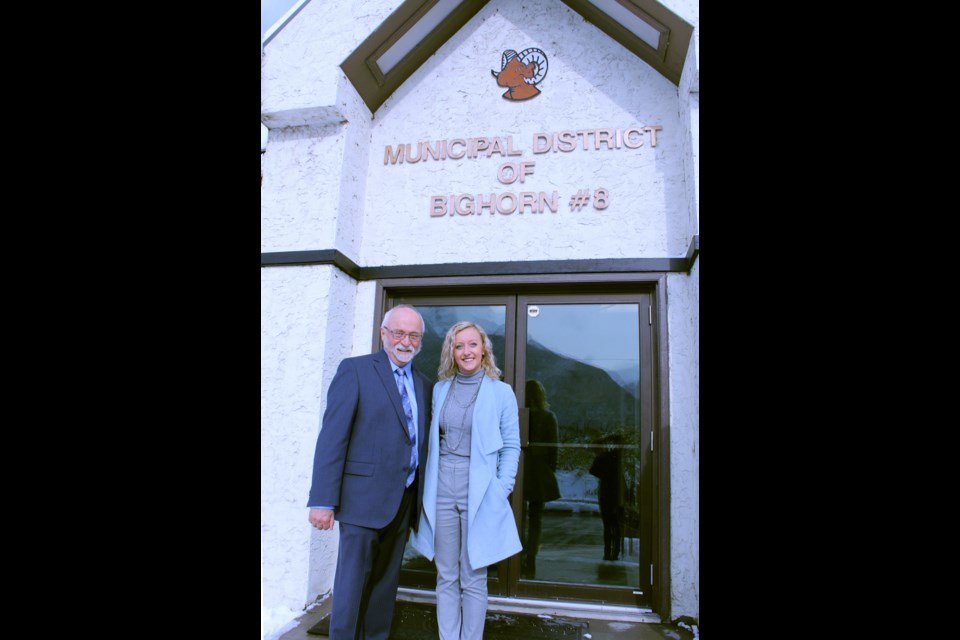BIGHORN – Reeve Dene Cooper could hardly contain his excitement as officials gathered in the MD of Bighorn council chambers Monday (Sept. 30) morning to announce the official land exchange between the municipality and the government of Alberta, which has been 16 years in the making.
"It has been a long and convoluted journey to get here," Cooper said.
The land swap means the province took control of a five-hectare parcel adjacent to the G8 Legacy wildlife underpass near Dead Man's Flats, in addition to 3.4 hectares of wildlife habitat directly adjacent to the Bow River, considered to be a vital piece of conservation land. The MD, meanwhile, received 23 hectares of land east of Exshaw for potential business development opportunities.
"This negotiation on the Dead Man's Flats land swap clearly demonstrates that this wasn't an easy decision for any parties," Cooper said.
Noting he was there during the early negotiations, along with MD Councillor Paul Ryan, Cooper said many of the original spearheads have retired, so he is grateful to see this land exchange go forward in his lifetime.
"This was a very complicated thing to do and achieve in the public interest because this is in the public's interest ... I'm very proud of what we have accomplished," Cooper said.
The controversial piece of land, located 10 kilometres east of Canmore adjacent the Trans-Canada Highway, in the hamlet of Dead Man's Flats, has been of public interest since 2003, when the lands north of the underpass were first flagged for land swap negotiations due to the close proximity of the wildlife corridor and underpass. Despite there being potential for commercial development, it was felt the lands were more aligned with conservation values of the nearby wildlife corridor, built as a legacy of the 2002 G8 summit in Kananaskis.
Almost a decade after the land was first noted as potentially problematic for development, the MD of Bighorn and the province both signed an agreement in 2012 to see the land swap go ahead with a terms and conditions letter signed with the belief the exchange would eventually happen.
Giving the province 75 acres near the wildlife underpass in the hamlet, the MD was expecting 19.2 acres of a former rock quarry site in the Bow Valley Wildland Provincial Park, along with three other Crown land sites outside the park. At the time the land was estimated at an approximate value of $80,000.
The letter required authorization from Alberta Tourism Parks and Recreation, since some of the Crown lands involved in the exchange were in the provincial park, however the minister at the time declined to sign it, halting the deal.
The hamlet then proposed an area structure plan to develop the land, which was approved in 2015. The Town of Canmore subsequently filed an appeal against it, claiming the MD’s plan to set aside 29 hectares of land for light-development would impact the functionality of the wildlife underpass on the Trans-Canada Highway and adjacent wildlife corridors.
The Municipal Government Board dismissed the appeal in March 2017, allowing the MD to move forward with its plans, however due to the ongoing negotiations with the province, there remained uncertainty about the area’s future development.
Earlier this year, the MD announced they were waiting to finalize a document between the MD and Alberta Environment and Parks after the MD accepted a letter during the February council meeting delineating the parcels of land that would be exchange by the two parties.
Then the provincial government changed.
While it was unknown at first if the land exchange would go forward with a new government – the third government since negotiations started – MLA Miranda Rosin was excited to announce the exchange Monday morning.
"After 10 years of negotiations, our government has reached an agreement with the MD of Bighorn to conduct a land swap, which will present the MD with much-needed developable land, while helping the province secure an elongated wildlife corridor to ensure the safety and protection of animals passing through the Bow Valley," Rosin said.
"This swap is vital to ensuring the land on which large populations of wildlife congregate and move will never be developed – increasing the safety of both animals and humans travelling along the Trans-Canada Highway ... we are excited to see the MD show enthusiasm and initiative to stir up economic activity within their boundaries."
The land values of the exchanged parcels are deemed to be of similar financial value by an independent appraiser, according to the Government press release.
Cooper noted while waiting for these lands has not been an easy thing to do, as the 1,334 populated MD runs modest "healthy, not wealthy" budgets, he always knew it was the right thing to do, as the underpass helps a variety of animals, including grizzly bears and wolverines, move through corridors safely.
Yellowstone to Yukon (Y2Y) Conservation Conservation Initiative officials, meanwhile, applauded the decision.
"I think the most important thing is it's amazing both the MD and government of Alberta have been at this for [more than] 10 years and that shows an incredible commitment to find a solution for wildlife," Adam Linnard, program manager for Y2Y said.
"Especially given the MD's limited property tax base, the fact that they kept exploring this option says a lot and that deserves a lot of congratulations."
Cooper said the work is not done yet.
Continuing to focus on wildlife corridors, Cooper said officials need to consider more fencing and over and under passes for wildlife, but he is grateful the tools have been established and the pioneering work is done.
"This is absolutely relieving ... this is the right thing to do," Cooper said.




